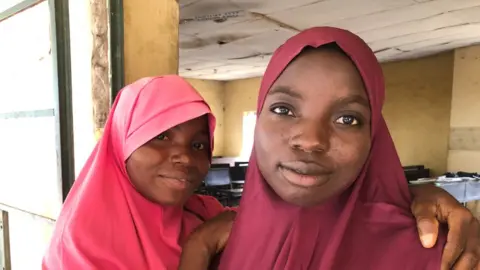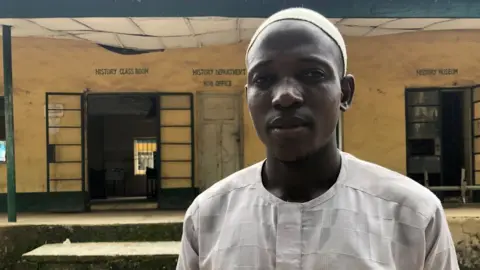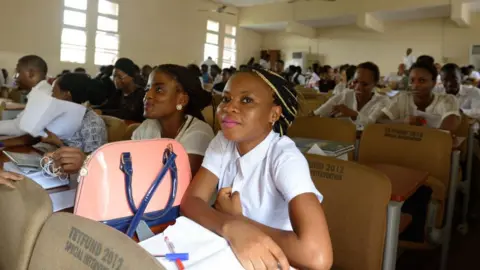Nigeria offers students loans - they want jobs
 Nduka Orjinmo/BBC
Nduka Orjinmo/BBCThere is a buzz in the home of Esther Abu, where mother and daughters have just heard about a new law that will see poor Nigerian families given loans to send their children to university.
Mrs Abu's youngest, a teenager who speaks like she is rapping, is leaving secondary school next month. She loves computer engineering but knows that her mother, a single parent whose salary as a street sweeper hardly provides enough food for the family - and has to be supplemented from alms given mostly by her church - does not have the money to send her to university.
Her eldest completed secondary school two years ago and immediately began work as a hair stylist to support the family who live in Mararaba, a congested suburb on the outskirts of Abuja.
"As a girl I dreamed of working as a doctor," says 21-year-old Eunice.
Both now have a chance, albeit slim, of reviving their dreams, as the government says it will provide loans to pay the tuition fees for people from such poor backgrounds. However many questions have been raised about the scheme.
Since coming into office at the end of May, President Bola Tinubu has carried out a raft of reforms at lightning pace - ending fuel subsidies, devaluing the naira, sacking the head of the central bank and security chiefs - and his latest aims to revamp Nigeria's ailing tertiary education sector.
For decades, fees have been kept low by the government to encourage enrolment in a country where many are poor and there is a high level of illiteracy.
While medicine students at the University of Lagos in Nigeria's richest state pay just 25,000 naira (£32; $26) per year, their peers at the University of Ghana in Accra pay 3,500 cedis (£242, $308).
But such low fees have not been matched by government funding over time which has led to schools with obsolete equipment, overcrowded classrooms, and poor remuneration for lecturers and other staff.
An average Nigerian university professor takes home less than 500,000 naira (£570; $725) a month, while a graduate assistant gets 160,000.
These conditions have led to incessant strikes, which saw universities closed for eight months last year - the ninth stoppage in 13 years.
The strikes and lack of adequate funding have eroded confidence in Nigeria's public universities, leaving people to enrol at expensive private establishments or to study abroad, especially in Eastern Europe.
By introducing the loans, President Tinubu has given universities a free rein to increase tuition fees, which the government reckons students from poor families can now afford.
The president says the scheme "will expand access to education to all Nigerians regardless of their backgrounds".
The zero-interest loan will be paid back as monthly deductions of 10% of the salaries of beneficiaries two years after they complete a mandatory post-graduate paramilitary service.
"But what if they finish school and don't get a job?" asks Mrs Abu in a low voice that hushed the room.
It is a question has been repeated across Nigeria by students and their parents since the scheme was announced two weeks ago.
Every year, huge numbers of graduates are pumped into Nigeria's labour market but only a few find a job.
In the last survey, in 2020, one in three of those who wanted to work were unemployed, and millions of graduates were doing jobs below their skillset such as working as hair stylists.
 Nduka Orjinmo/BBC
Nduka Orjinmo/BBC"I know at least 200 graduates in my village who returned to farming after going to school because of no jobs," says Ayuba Mayah, a student at the College of Education in Zuba, Abuja.
He is not going to take the loan, he says, to avoid that burden hanging around his neck while job-hunting after graduating. Instead, he is working to pay for his education.
Aminu Sadiya and Mercy Sunday, who are both studying economics at the same college, agree that getting a job is their main concern about taking the loan.
"My parents did not think of a loan before they sent me to school, they will find a way to pay the fees," says Ms Sunday, whose parents are farmers.
Though Mr Tinubu has promised to halve the unemployment rate in three years by creating millions of jobs for young people, the new law is mute about graduates who can't repay the loan because they are unemployed.
However, those who become self-employed risk a two-year jail term or fine if they refuse to pay back the loan as 10% of their monthly profits.
But the loan is not available to all - it is specifically for students that come from homes with an income of less than 500,000 naira annually.
In theory, millions could benefit, but the conditions for acquiring a loan are stringent.
Poor families will have to prove they earn that little, which means they will have to provide bank statements which many of them are unlikely to have.
Applicants are also required to provide at least two guarantors:
- a senior civil servant
- lawyer with at least 10 years experience
- judicial officer or justice of peace
It has been pointed out that poor Nigerians are unlikely to know such people, and where they do, have a slim chance of such a person standing as a guarantor for a loan.
Even after meeting the requirements, applicants are not guaranteed the loan as it is subject to the availability of funds.
"They should just say they don't want anyone to access the loan," says Vanessa Macaulay, a third-year Mass Communication student at the Yaba College of Technology in Lagos.
The president of the universities lecturers' union also describes the loan conditions as "not practicable", adding that more than 90% of students won't meet the "requirements".
But other academics such as Professor Mudashiru Mohammed, who heads the Education Management department at state-owned Lagos state university, says despite tuition fees of just 30,000 naira (£34, $43) per semester, many of his students cannot pay.
 Getty Images
Getty ImagesHe says the conditions were necessary to ensure people paid up, in a country where most see government loans as free money.
While it is hard to measure the financial background of students in public tertiary schools, many at the University of Abuja tell the BBC they are from low-income homes.
Their education is funded by parents and guardians who are junior civil servants, private security guards and company drivers.
Combined earnings in such families are often just above the threshold, putting the loan out of reach, even though they are not well-off by Nigerian standards.
These families have already taken hits from transport fares that have doubled, while the cost of food has also soared recently.
Now, they will have to deal with tuition fees which have gone up in some universities - which have been mulling increases since last year - by as much as 200%.
The loan is strictly for tuition and excludes other fees such as accommodation and food, which usually account for a higher proportion of the total cost of university.
"If they are not paying for everything, then what is the point of it? Who will buy books, pay for hostel, feeding," asks Mrs Abu, the chatter long extinguished in her home.
"They should have made the loans available to every student," says Caleb Issac a self-sponsored part-time student at the National Open University in Abuja.
In his spare time he works as a marketer for a transport company and fears a hike in fees will be hard on him.
This is not Nigeria's first attempt at a students' loan - an initial plan in 1972 by the military government crumbled because beneficiaries refused to repay, says Prof Mohammed.
"Maybe the president should have first concentrated on creating jobs," says Mrs Abu.
The lack of jobs, other fees involved and a lack of clarity about what will happen to employees who default on repayments, mean the loan does not work for her family, she says.
"Better if my daughters learn trades and get small jobs than go to school and face jail," she says.
- AFRICA DAILY PODCAST: Is there a solution for graduate unemployment?
